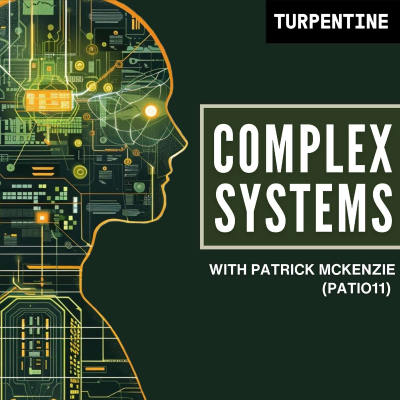
Complex Systems with Patrick McKenzie (patio11)
Podcast af Patrick McKenzie
Prøv gratis i 7 dage
99 kr. / måned efter prøveperioden.Ingen binding.

Mere end 1 million lyttere
Du vil elske Podimo, og du er ikke alene
Bedømt til 4,7 stjerner i App Store
Læs mere Complex Systems with Patrick McKenzie (patio11)
We live in a world where our civilization and daily lives depend upon institutions, infrastructure, and technological substrates that are _complicated_ but not _unknowable_. Join Patrick McKenzie (patio11) as he discusses how decisions, technology, culture, and incentives shape our finance, technology, government, and more, with the people who built (and build) those Complex Systems.
Alle episoder
57 episoderPatrick McKenzie (patio11) is joined by Bean, a pseudonymous defense industry expert, to explore the intellectual crossovers between military and civilian domains. The conversation reveals how the defense industry's fundamental constraint of having only one customer (a monopsony) creates entirely different incentives than tech, leading to conservatism and 30-50 year product lifecycles. Bean argues that drones are largely modern iterations of cruise missiles we've had since the 1950s, and explains why current anti-drone defenses make swarm attacks less threatening than headlines suggest. – Full transcript available here: www.complexsystemspodcast.com/defense-with-bean-of-naval-gazing/ [https://www.complexsystemspodcast.com/defense-with-bean-of-naval-gazing/] – Sponsor: This episode is brought to you by Mercury [https://mercury.com/?utm_source=complex_systems&utm_medium=sponsored_podcast&utm_campaign=25q2_brand_campaign], the fintech trusted by 200K+ companies — from first milestones to running complex systems. Mercury offers banking that truly understands startups and scales with them. Start today at Mercury.com [https://mercury.com/?utm_source=complex_systems&utm_medium=sponsored_podcast&utm_campaign=25q2_brand_campaign] Mercury is a financial technology company, not a bank. Banking services provided by Choice Financial Group, Column N.A., and Evolve Bank & Trust; Members FDIC. – Recommended in this episode: * Naval Gazing: https://www.navalgazing.net/ [https://www.navalgazing.net/] –– Timestamps: (00:00) Intro (00:29) The overlap between tech and defense (01:35) Operations research in World War II (02:55) Mathematical insights and military strategies (05:28) The role of operations research in modern warfare (16:59) Tech and defense (Part 1) (19:48) Sponsor: Mercury (21:00) Tech and defense (Part 2) (26:07) Economics behind the defense industry (32:07) SpaceX's early challenges and achievements (33:00) The Super Hornet development story (34:39) Military procurement lessons (37:42) Aerospace industry retention rates (38:42) Lockheed Martin's dominance and supply chain (40:55) Drone technology and military applications (46:53) Anti-drone defenses and future warfare (48:01) Naval warfare and historical perspectives (01:01:03) Wrap
This week on Complex Systems, Patrick McKenzie (patio11) is joined by Joel Becker from METR. They discuss groundbreaking research on AI coding assistants. Joel et al’s randomized controlled trial of 16 expert developers working on major open source projects revealed a counterintuitive finding: despite predictions of 24-40% speed improvements, developers actually took 19% longer to complete tasks when using AI tools, even though they retrospectively believed they were 20% faster. The conversation explores why even sophisticated professionals struggle to accurately assess their own productivity with AI tools, the industrial organization of software development, and the implications for AI's recursive self-improvement in research and development. It also touches on other perspectives from software developers using these tools professionally, and where we can expect them to improve rapidly. – Full transcript available here: www.complexsystemspodcast.com/the-great-developer-speed-up-with-joel-becker/ [https://www.complexsystemspodcast.com/the-great-developer-speed-up-with-joel-becker/] – Sponsor: This episode is brought to you by Mercury [https://mercury.com?utm_source=complex_systems&utm_medium=sponsored_podcast&utm_campaign=25q2_brand_campaign], the fintech trusted by 200K+ companies — from first milestones to running complex systems. Mercury offers banking that truly understands startups and scales with them. Start today at Mercury.com [https://mercury.com?utm_source=complex_systems&utm_medium=sponsored_podcast&utm_campaign=25q2_brand_campaign] Mercury is a financial technology company, not a bank. Banking services provided by Choice Financial Group, Column N.A., and Evolve Bank & Trust; Members FDIC. – Recommended in this episode: * METR: https://metr.org/ [https://metr.org/] * Joel Becker’s site: https://joel-becker.com/ [https://joel-becker.com/] – Timestamps: (00:00) Intro (00:34) Understanding AI evaluation methods (02:04) METR's unique approach to AI evaluation (03:10) The evolution of AI capabilities (06:44) AI as coding assistants (09:15) Research on AI's impact on developer productivity (13:55) Sponsor: Mercury (15:07) Challenges in measuring developer productivity (20:38) Insights from the research paper (31:26) The formalities of software development (32:07) Automated tools and human discussions (32:47) AI and style transfer in software (34:35) The role of comments in AI coding (36:51) The future of AI in software engineering (40:25) Economic implications of AI in software (46:53) Challenges and risks of AI in software (59:03) Security concerns with AI-generated code (01:04:59) Wrap
In this solo episode, Patrick McKenzie reads his classic essay "Seeing Like a Bank," exploring why financial institutions often appear to have no memory of previous customer interactions despite being excellent at tracking money itself. He breaks down the complex web of legacy systems, tiered support structures, and regulatory constraints that create Kafka-esque experiences for bank customers. Using the lens of institutional legibility borrowed from "Seeing Like a State," Patrick explains how banks' technical architecture and organizational design choices—from core processing systems to customer service tiers—systematically generate the dysfunction that customers experience when things go wrong. – Full transcript available here: www.complexsystemspodcast.com/how-banks-actually-work/ [https://www.complexsystemspodcast.com/how-banks-actually-work/] – Recommended in this episode: * Patrick’s Bits about Money essay, Seeing like a bank: https://www.bitsaboutmoney.com/archive/seeing-like-a-bank/ [https://www.bitsaboutmoney.com/archive/seeing-like-a-bank/] – Timestamps: (00:00) Intro (03:52) Recordkeeping systems (10:20) Sponsor: Safebase (11:50) Human accountability and its malcontents (22:57) Two embedded surprises about bank staffing (27:47) Society has goals which conflict with banks being good at banking (30:52) So what can be done about this?
Patrick McKenzie (patio11) is joined by Jim Weisser, a serial entrepreneur and founder of SignTime, for an in-depth exploration of Japan's software market and startup ecosystem. They discuss the unique challenges of building software in a culture that prizes stability over rapid iteration, the dominance of systems integrators, and how Japan's economic stagnation shaped its relationship with technology. The conversation covers everything from Excel-driven development processes to the recent transformation of Japan's VC landscape, offering insights for anyone considering doing business in the world's third-largest economy. – Full transcript: https://www.complexsystemspodcast.com/building-software-in-japan-with-jim-weisser/ [https://www.complexsystemspodcast.com/building-software-in-japan-with-jim-weisser/] – Sponsor: BoxWorks 2025 [https://bit.ly/452036h] Discover hands-on AI data extraction techniques, network with industry experts, and hear featured speakers Vinod Khosla, Jared Kaplan, and Aaron Levie at BoxWorks 2025 in San Francisco (Sept 11-12). Use code BW25-ComplexSystems for 50% off at this link: https://bit.ly/452036h [https://bit.ly/452036h] – Links: Signtime:: https://www.signtime.com/en/ [https://www.signtime.com/en/] – Timestamps: (00:00) Intro (00:24) Exploring the Japanese software market (01:25) Challenges in the Japanese startup ecosystem (02:37) Jim Weisser's background and journey (05:14) The evolution of Japan's economy and business practices (10:15) Understanding Japan Inc. and its impact on software (10:28) The role of systems integrators in Japan (19:01) Sponsor: BoxWorks Conference 2025 (*discounted tickets for Complex Systems listeners) (20:29) Cultural differences in software development (26:06) Digital transformation and efficiency in Japan (32:44) Labor market dynamics and employment practices (35:50) Startup ecosystem and equity culture in Japan (42:53) Success stories and market potential in Japan (43:42) Corporate relationships in Japanese companies (44:10) Salesforce's success in Japan (45:44) E-commerce boom in Japan (46:33) Rakuten's evolution and strategy (48:27) Amazon's journey in Japan (49:13) Cloud services and security concerns (51:18) Sansan: Business card management (55:14) Venture capital landscape in Japan (01:05:02) Personal reflections on living in Japan (01:16:21) Wrap
Patrick McKenzie (patio11) is joined by James Riney, partner at Coral Capital, to explore Japan's transformation from a $700 million startup ecosystem to today's $5-10 billion market. They discuss the cultural and structural factors that initially limited venture activity in Japan. The conversation covers unique aspects of building startups in Japan, from the quirks of being a foreign professional to why Japanese engineers love Twitter but ignore LinkedIn, plus insights into Japan's "time machine advantage" and why American-developed dev tools are going viral in Tokyo. – Read full transcript here: www.complexsystemspodcast.com/startup-investing-in-tokyo/ [https://www.complexsystemspodcast.com/startup-investing-in-tokyo/] – [Patrick notes: Complex Systems now produces occasional video episodes! You can access them directly on YouTube: www.youtube.com/@patio11podcast [https://www.youtube.com/@patio11podcast]. My kids inform me that I’m supposed to tell you to like and subscribe.] – Sponsor: Safebase Leading companies use SafeBase to eliminate up to 98% of inbound security questionnaires, automate workflows, and accelerate pipeline. Go to safebase.io/podcast [https://safebase.io/podcast] – Links: * Coral Capital: https://coralcap.co/ [https://coralcap.co/?lang=en] – Timestamps: (00:00) Intro (01:57) The early days of Japanese startups (04:08) The rise of Coin Check (05:54) Challenges and opportunities in the Japanese startup ecosystem (16:09) Cultural and structural differences in hiring (19:47) Sponsor: Safebase (21:22) The role of content and communication in Japanese startups (31:29) LinkedIn vs. Facebook in Japanese work culture (32:38) LinkedIn's social capital issues in Japan (33:58) Cultural differences in asking for permission (34:31) Navigating Japanese regulatory clarity (36:49) The evolution of VC investment in Japan (39:54) The rise of SaaS in Japan (45:26) System integrators and software development in Japan (50:39) Challenges in Japanese tech companies (54:36) Opportunities for foreign companies in Japan (55:03) The importance of commitment in the Japanese market (57:08) Dev tools and viral adoption in Japan (59:31) Japan's influence on global tech (01:03:23) Wrap

Bedømt til 4,7 stjerner i App Store
Prøv gratis i 7 dage
99 kr. / måned efter prøveperioden.Ingen binding.
Eksklusive podcasts
Uden reklamer
Gratis podcasts
Lydbøger
20 timer / måned

































